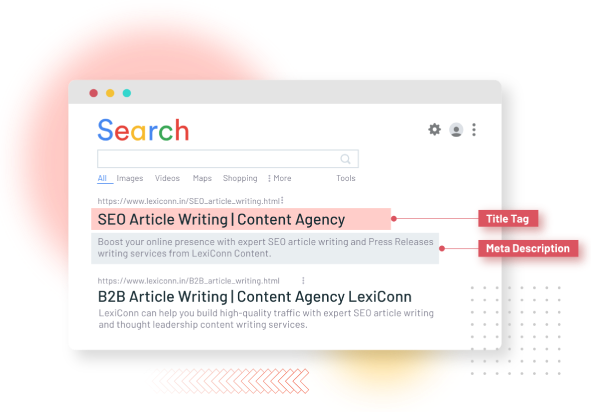

Artificial Intelligence (AI) is rapidly changing the digital marketing field, offering tools and techniques that make complex tasks more efficient. From analyzing data to enhancing customer experiences, AI has proven its value across various marketing functions. But when it comes to SEO, a critical component of digital success, how does AI fit in?
The growing reliance on AI content creation has sparked curiosity about its effectiveness. Can AI-generated content meet SEO requirements, rank well on search engines, and still engage audiences? While AI offers incredible potential, achieving success requires more than just automation; it demands a strategic approach and thoughtful integration.
In this blog, we’ll explore how AI is shaping the future of SEO. You’ll learn how to use AI-generated content effectively for SEO, the benefits it brings, and the challenges to watch for as you integrate AI into your digital strategy. Whether you’re aiming to improve rankings or streamline your workflow, this guide will provide actionable insights to make AI work for you.
Before we dive into the nitty-gritty of AI-powered content, it’s essential to understand why SEO is such a critical part of digital marketing. SEO is the backbone of visibility online. Simply put, it's how search engines like Google rank content, determining which pages appear first in search results. High-quality, well-optimized content is one of the primary ways to improve rankings.
However, achieving high rankings is not that straightforward. It requires a keen understanding of algorithms, keyword research, user intent, and much more. AI content writing is an innovative solution that solves SEO's complexity with precision, scale, and efficiency.
In the past, optimizing content for search engines was mostly a manual, time-consuming task. Today, generative AI tools—powered by advanced algorithms—are transforming this process. By analyzing vast amounts of data, AI tools help create content that is SEO-friendly, high-quality, and relevant to the target audience.

Now, let’s explore why AI content is so impactful for SEO. Here are several key benefits of integrating AI-powered writing into your SEO strategy:
1. Keyword Optimization and Research: One of the most crucial aspects of SEO is keyword research. AI excels in this area by quickly analyzing massive datasets, identifying the best keywords, and suggesting the most effective ones for targeting your specific audience. AI tools can even predict future trends, enabling you to stay ahead of the competition.For example, AI tools can spot long-tail keywords by analyzing search data to find specific, less common phrases users search for. These keywords often have lower competition but are highly relevant to niche topics. AI algorithms identify patterns and user intent, helping to discover keywords that may not be immediately obvious.
2. Content Generation at Scale: Another significant advantage of AI-powered content is the ability to generate content at scale. Traditional content writing often requires significant time and effort. With AI, content can be produced in bulk, maintaining consistency and quality across different types of content—whether blogs, articles, or product descriptions.Imagine having to write 30 product descriptions in a day. With AI content generation tools, you could have those 30 descriptions ready in a fraction of the time that is all optimized for SEO.
3. Increased Efficiency and Speed: In the fast-paced world of SEO, timing is everything. Search engines constantly update their algorithms, and staying ahead of these changes requires constant content updates. AI-powered tools can help businesses quickly adapt their content strategies in response to shifts in search algorithms or trends.AI tools can scan existing content, suggest improvements, and even reformat content to align with the latest SEO guidelines. This automation significantly reduces the time it takes to refresh and optimize content, keeping you competitive in the ever-changing SEO industry.
4. Improved Content Relevance and User Engagement: AI can help tailor content to your specific audience by analyzing user behavior, search patterns, and interests. By using AI tools, businesses can ensure that their content is relevant to what users are actively searching for, improving engagement rates and reducing bounce rates (Bounce rate refers to the number of visitors who land on a page on your site, don't engage, and leave).AI-powered tools can also optimize content based on user intent, ensuring that the content answers the specific questions users are asking. This approach aligns perfectly with Google’s evolving focus on user-centric content.
5. Content Personalization: As we move toward a more personalized digital experience, AI allows for a level of customization previously unattainable. AI can analyze past behaviors and preferences to deliver hyper-targeted content recommendations, improving the chances of your content being discovered and engaged with by the targeted audience.With the help of AI, you can produce different variations of a single piece of content tailored to various segments of your audience, which will not only improve SEO rankings but also drive conversions.
From seo-optimized blogs to top-ranking web copies, LexiConn offers 20+ content creation services powered by AI.
For businesses concerned about how search engines like Google view AI content, the good news is that Google does not penalize AI-generated content outright. However, like human-written content, AI content must adhere to Google’s stringent quality guidelines—chief among them being E-E-A-T (Experience, Expertise, Authoritativeness, and Trustworthiness).
This means that while AI can help generate content quickly, it’s essential to ensure that the content also provides value to the user. Google wants to rank content that is helpful, informative, and credible. AI tools can support this by producing high-quality content that is both relevant and optimized for search engines.
The key is ensuring that AI content aligns with these core principles and doesn’t compromise on quality or accuracy. This is where a balance between human creativity and AI’s efficiency comes into play.
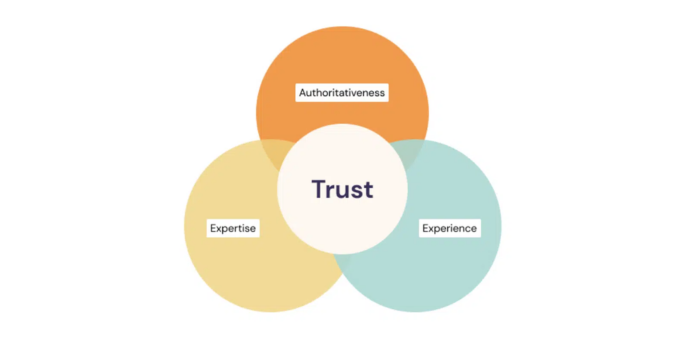
Source Can AI Be Aligned with E-E-A-T Guidelines?
AI can play a crucial role in helping content creators and businesses adhere to E-E-A-T (Experience, Expertise, Authoritativeness, and Trustworthiness) guidelines, which are essential for ranking well on search engines like Google. Here’s how AI aligns with these principles:
By analyzing user behavior, search intent, and feedback, AI helps craft content that complies with search engine requirements and provides readers with genuine value.
This synergy between AI and E-E-A-T ensures that businesses can leverage cutting-edge tools without compromising on quality, authority, or trustworthiness.
At LexiConn, we ensure all ranking expected content pieces in varying formats are developed while abiding by the E-E-A-T guidelines of Google, which not only ensures a desirable ranking but also solidifies the chances of long-term dominance in the ranking position.
The role of AI in SEO isn’t just limited to content creation. AI can optimize a website’s entire SEO strategy, from content planning to technical SEO. Here’s how AI can streamline SEO efforts:
1. Automation of SEO Tasks: SEO involves numerous repetitive tasks like keyword research, competitor analysis, and backlink analysis. AI-powered tools can automate these tasks, freeing up time for marketers and content creators to focus on more strategic aspects of SEO.For example, AI can conduct automated audits, track website performance, and identify optimization opportunities across multiple web pages. This ensures that SEO efforts are constantly monitored and optimized.
2. Enhanced Search Optimization: AI tools can assist in identifying areas of improvement across your website’s on-page SEO. This includes optimizing meta tags, header tags, image alt texts, and more—all of which are essential for search optimization. 3. AI for Link Building: Building quality backlinks remains a crucial SEO tactic. AI can analyze your competitor’s backlink profiles, identify high-quality link-building opportunities, and suggest which sites to target for link outreach. Additionally, AI can optimize anchor text and ensure that links are relevant to your content. 4. Continuous Optimization of Content: SEO is not a one-time process but an ongoing effort. AI tools can constantly analyze user data and search trends, suggesting content updates and new topics to explore. AI can even help you identify areas where your existing content is underperforming and suggest changes to improve its SEO ranking.This makes AI not just a tool for generating new content but a long-term partner in maintaining and optimizing your content strategy.
At LexiConn, AI is leveraged especially as part of the brainstorming and content strategy formation, which are refined and further polished by experienced content strategists and marketers without compromising the slightest with content quality. The assistive role of AI has helped LexiConn build AI-powered seo writing strategies from tech to finance businesses that have boosted KPIs in the form of boosted traffic and CRO in a short amount of time.

AI is reshaping SEO practices with new opportunities and challenges. Staying updated on these changes is crucial for those aiming to stay competitive. Here are some key developments expected in the AI-SEO global combination:
AI-Enhanced Search ResultsGoogle's AI Overviews are set to transform how users interact with search results. These summaries provide quick answers, relevant links, and prompts for deeper exploration, presenting a new layer of competition for content creators. Optimizing for these overviews means focusing on concise, authoritative answers that directly address user queries while maintaining traditional SEO practices to retain visibility in conventional search results.
Personalized Search ExperiencesAI-driven personalization tailors search results based on individual user behavior and preferences. For instance, frequent video watchers may see more video results, while text-oriented users might be served in-depth articles. This shift emphasizes the need for content creators to diversify formats and ensure their content meets the preferences of various user segments, from text to visuals and videos.
Topical Authority as a PriorityBuilding topical authority is increasingly important for SEO success. Comprehensive content on specific subjects, supported by a robust site structure, helps establish expertise in a niche. Creating content pillars and topic clusters that cover core subjects and subtopics not only strengthens your website’s authority but also improves its discoverability.
A pillar page serves as a detailed resource offering an in-depth overview of a specific topic. A topic cluster consists of a network of interconnected articles and pages, all focusing on various subtopics under the same overarching theme.
Video content is becoming indispensable for SEO, with users showing a strong preference for this format. A well-thought-out video SEO strategy, including optimized titles, descriptions, and tags, ensures better visibility on platforms like YouTube. Similarly, the rise of voice search demands content that is conversational and directly answers common user queries, emphasizing long-tail keywords and natural language.
Multi-Channel OptimizationAs users engage across multiple platforms, SEO strategies must adapt to provide seamless experiences. Optimizing content for search engines, social media, and mobile apps ensures greater reach and engagement. Regular performance analysis across platforms allows for fine-tuning strategies to maximize impact.
The integration of AI into SEO is just beginning, and its future promises both innovation and complexity. By embracing these advancements and maintaining a balance between AI tools and human expertise, businesses can adapt and thrive in this evolving landscape.
The rise of AI-powered content writing marks an exciting chapter in the evolution of SEO. By leveraging AI tools to create optimized, user-centric content, businesses can streamline their SEO efforts, boost their search rankings, and stay ahead of the competition. The future of SEO is here, and AI is playing a pivotal role in shaping it.
So, if you’re not already incorporating AI content into your SEO strategy, now is the time to start. The future of SEO is powered by AI, and the earlier you adopt this technology, the more benefits you’ll reap in the long run.
The right approach is to combine automation with human expertise to achieve both speed and high-quality results. At LexiConn, we bring you the best of both worlds by blending advanced AI content with expert editorial supervision. This ensures your content is created efficiently and adheres to top-quality benchmarks.
Book a free consultation with LexiConn! We offer a free 30-minute consultation to help you refine your content strategy.
Get in touch:
Website: www.lexiconn.in
Email: [email protected]
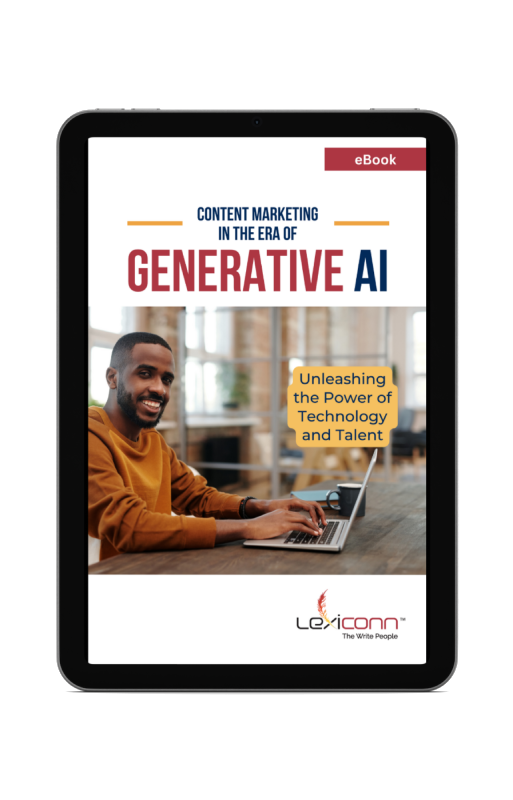
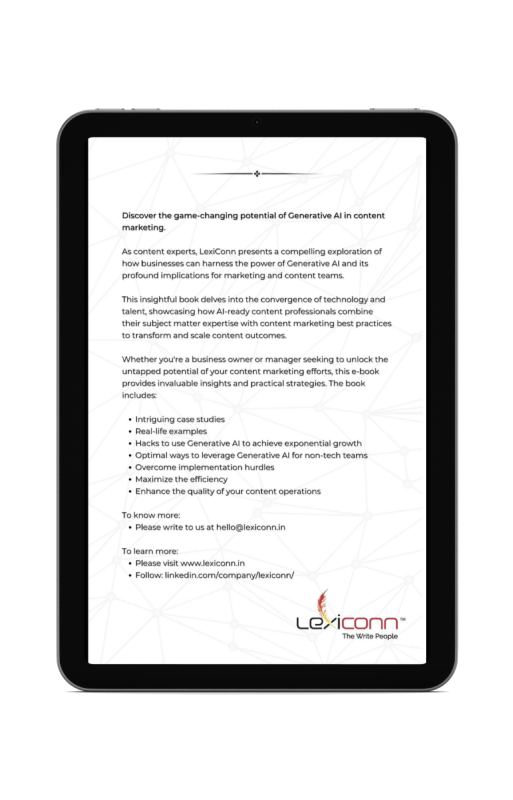
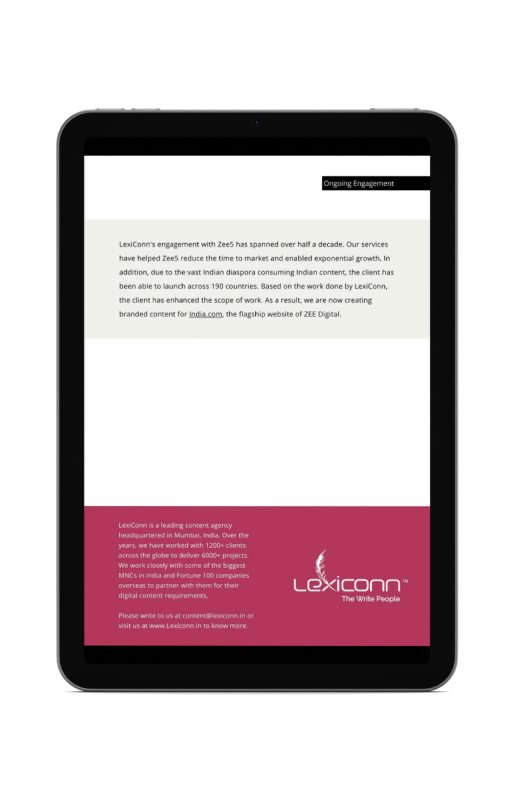
I have read and accept the Privacy Policy
Read More